The Surprising Connection Between Ryobi And Milwaukee Tools Explained
We may receive a commission on purchases made from links.
If you examine Ryobi and Milwaukee tools side by side, either online or in the power tool aisle, the most obvious difference lies in their price tags. At Home Depot, the Milwaukee M18 FUEL Lithium-Ion Cordless Drill retails at $229, while the comparable Ryobi ONE+ 18V Cordless Drill retails at a breezy $79. Milwaukee is the more established brand of the two, having developed a reputation for quality in its almost 100 years of operation. Then there's Ryobi, a younger power tool brand known for its prices that can't be beat. The prevailing rhetoric around these two brands defines Milwaukee as a tool for professionals and Ryobi as a good choice for amateurs and DIYers on a budget (and for those on an even tighter budget, there are ways to get power tools for free, no matter the brand.)
Despite the commentary surrounding Ryobi and Milwaukee, they have a lot in common. Both are owned by Techtronic Industries (TTi), a Hong-Kong based international company responsible for designing and manufacturing cordless tools for a variety of industries. Because of this commonality, many consumers, professional and amateur alike, have been wondering if the tools are made in the same factory and how different they really are.
Are Ryobi and Milwaukee tools made in the same factories?
While Ryobi and Milwaukee may be owned by the same company, this does not mean they are manufactured in the exact same way. TTi is a multinational company with factories in China, the U.S., Vietnam, and other countries where major manufacturing takes place. Some factory overlap is bound to happen, but even if the two brands could be found in the same factory at some point, tool manufacturing is a complex process — any given tool could consist of parts produced in different facilities all across the world. Ryobi and Milwaukee tools' parts potentially sharing a factory means little compared to how those fully assembled tools function.
The drastic price difference between Ryobi and Milwaukee tools can give some consumers pause, implying either that Ryobi is less reliable or that Milwaukee is unreasonably marked up. Neither is true — the brands simply serve different markets. Ryobi caters more toward homeowners in need of affordable options, and Milwaukee targets professionals who require more powerful tools with niche applications. When searching for the next essential tool every homeowner should have, concentrate less on the brand name and more on what you need to use it for.
Which brand is right for you, Milwaukee or Ryobi?
Like siblings, Ryobi and Milwaukee tools may come from the same place, but they are fundamentally different and meet different needs. Milwaukee tools have a lot of power behind them and a long battery life meant to last through a demanding workday. On the other hand, Ryobi is built for occasional use, with a shorter battery life and less strength. This is not a downside to Ryobi, since the average homeowner or DIYer likely doesn't need Milwaukee's level of power and may not want to pay the higher price tag for a tool they're planning to use less frequently.
Since Ryobi is more geared toward amateurs, it also offers tools specific to crafting and regular home maintenance, like glue guns and compact, quiet leaf blowers. You can also use other brands' tools with your Ryobi batteries, increasing the brand's versatility. Though Ryobi is cheaper, Milwaukee is more concerned about a tool's power and longevity than its price. If you're a seasoned DIY pro who needs tools to do more and last longer, Milwaukee products may be worth the investment.


